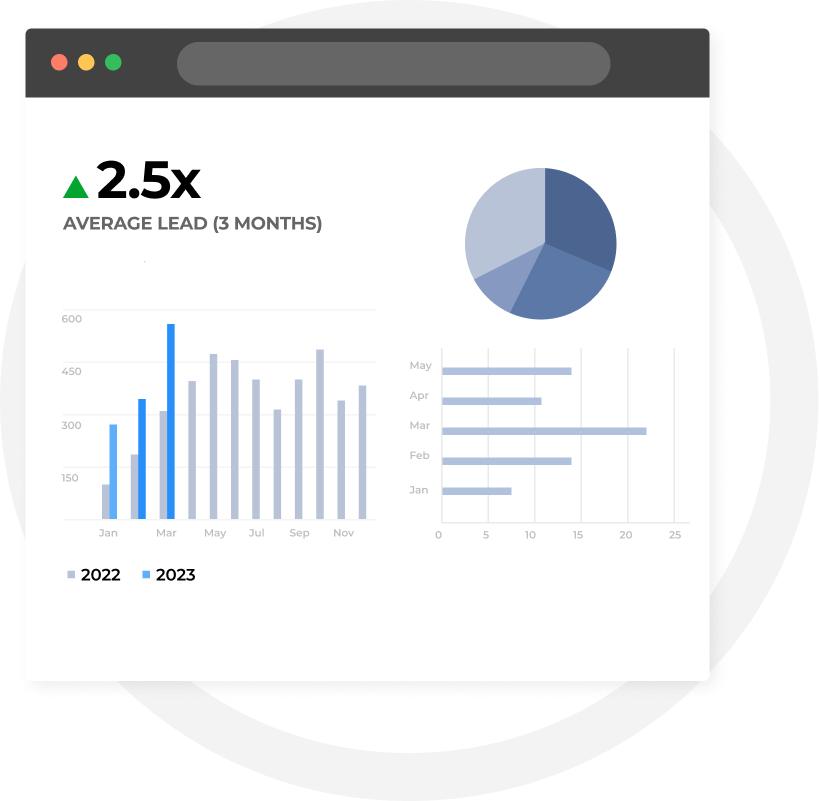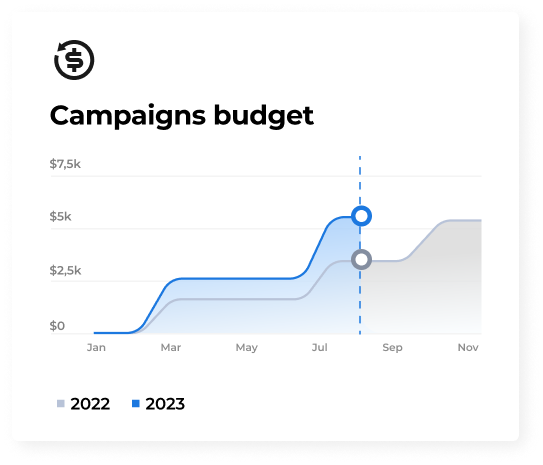Digital Marketing Services
Grow Your Business with Comrade's Marketing Services
Select goals you want to achieve
Recognized as a Leading Digital Marketing Agency
Providing The Best Internet Marketing Services to Solve Your Problems
Providing Marketing Services to Businesses and eCommerce Stores Since 2008
Why Your Business Needs Marketing Professionals
- Turbocharging your lead generation and sales opportunities
- Elevating your brand's recognition among current and potential customers
- Increasing customer satisfaction and brand loyalty





* Typical results generated for our clients in the first year of our engagement.
Why Choose Comrade as Your Marketing Agency
We’re so passionate about online marketing that we’ve been recognized by some pretty awesome folks like Google, Shopify, Hermes, and HubSpot! But awards are just trophies on the shelf – what really matters is helping businesses like yours thrive online.
We analyze data and trends to craft your ideal marketing plan. Then, we set clear goals (more visitors? paying customers?) and track progress by sending you monthly reports. This lets us fine-tune your digital marketing strategies for ongoing success.
We’ve been around for over 12 years, helping over 320 businesses grow! No matter what you do, from stone countertops to legal counsel or health care, we speak your industry’s language and build custom marketing plans to get the results you need.
We’re a full-package deal, offering everything from top-level website development and design to the nitty-gritty of SEO, PPC, and even content marketing and reputation management. Trust us to bring the whole marketing package with a seamless approach from beginning to end.
Digital Marketing Services That Drive Results
With Comrade by your side, you can unlock the full potential of your business. Whether you're a small start-up or a large corporation, our digital marketing specialists have the skills and know-how to take your brand to the next level.
Marketing Service Packages
Steady Growth
$2,500 / mo
Basic package
The Basic Package is for ambitious startups and smaller businesses ready to conquer their niche. We'll build a rock-solid digital foundation that attracts your ideal customers and fuels consistent growth. Forget the boom-and-bust cycle – the Basic Package is your roadmap to long-term success in your target market.
- 100 key phrases optimized
- Up to 20 website pages optimized
- Standard SEO strategy
- Basic Technical Optimization
- Up to 10 Local Directory Submissions
- Basic PPC Campaign Setup
- 8000 pages produced before release
- Standard KPIs reports and review
Read more
Faster Growth
$4,250 / mo
Steady Growth Pack Guaranteed
The Steady Growth Pack amplifies your reach, ignites engagement, and propels you past the competition. Picture a flood of targeted traffic, targeted ads, and insightful analytics driving more conversions and loyal customers than ever before.
- 150 key phrases optimized
- Up to 30 website pages optimized
- Detailed SEO strategy
- Extensive On-Site SEO Setup
- Deep Technical Optimization
- Up to 20 Local Directory Submissions
- Thorough PPC Campaign Setup
- 10000 pages produced before release
- Detailed KPIs reporting (monthly)
- Competitor Analysis (monthly)
- UX Reporting (monthly)
- Lead qualification
Read more
Full Speed Growth
$6,000+ / mo
Faster Growth Pack Guaranteed
The Faster Growth Package utilizes growth-hacking strategies that put your brand on hyperdrive. Advanced SEO gets you to the top of search results, multi-channel advertising turns website visitors into clients, and Conversion Rate Optimization squeezes every ounce of your website's potential. Watch your market share surge and your business explode with our dynamic marketing campaign.
- 200 key phrases optimized
- Up to 40 website pages optimized
- Full-Scale SEO strategy
- Deep On-Site SEO Setup
- Full-Scale Technical Optimization
- Up to 30 Local Directory Submissions
- Full PPC Campaign Setup
- 12000 pages produced before release
- Detailed KPIs reporting (monthly)
- Deep Competitor Analysis (monthly)
- Thorough UX reporting (monthly)
- Channel-Specific lead qualification
Hide



Clear Internet Marketing Services Pricing
- Your goals: are you interested in slow, steady growth or an aggressive, faster-acting approach?
- How competitive is your specific industry market? Is it highly saturated?
- Current starting point: do you need to take a site to a new level, have an outdated website, no website at all?
Comrade Digital Marketing offer:
Internet Marketing Services That Can Help Any Business
We've been in the marketing game for over 20 years. From law firms to healthcare heroes and home improvement whizzes to e-commerce entrepreneurs, Comrade has helped over 300 businesses like yours succeed online. We pride ourselves on our professional and dedicated approach, ensuring that your online presence is maximized and effectively reaches your target audience.
Marketing For Lawyers
Marketing for Contractors
Marketing for Small Business
Healthcare Marketing Services
We Find the Right Internet Marketing Solution for Your Needs
Get solution332 clients and counting rely on Comrade Marketing Agency
Take your business to the next level. Book a complimentary audit today
- Firm’s Reputation
- Potential demand
- Web Presence
- Website Performance
- Rank competitors
- Overall Score

Here’s What Our Marketing Clients Want to Know
What are the Digital Marketing Services?
Ever wonder how some businesses seem to magically appear everywhere you look online? That’s the power of internet marketing! It’s like a toolbox of powerful strategies to bring customers straight to you. Instead of chasing them down with old-school methods like flyers, internet marketing uses websites, social media, videos, and more to turn casual browsers into loyal fans. Think search engines that put your business at the top, social media marketing that spark conversations, and targeted emails that land straight in your ideal customer’s inbox. It’s all about building a strong online presence that attracts attention and excites people about what you offer!
How Much Do Digital Marketing Services Cost?
Internet marketing isn’t a one-size-fits-all deal. It depends on your goals. Let’s take your website: are you after a basic info hub or a full-blown lead-generating machine? The fancier you get, the more the price increases ($10,000 to $40,000). Marketing is the same story. The costs depend on what you already have and what you want to achieve. Monthly fees can range from $2,500 to $10,000, but the average is around $4,000. The good news? We offer three packages tailored toward different goals and budgets.
Should My Business Invest in Digital Marketing Efforts?
Yes, especially if you’re not a digital marketer who can provide full-service digital marketing for your business. Plus, not investing in digital marketing is the equivalent of having a storefront on a deserted island. Everyone’s searching for stuff online, and your business has to be there to greet them with a big, friendly “Welcome!” Digital marketing lets you target the exact kind of people who need your product or service, build relationships with them, and turn them into loyal customers.
How Do I Choose the Best Digital Marketing Company?
Finding the right marketing partner is all about asking the right questions. First, dig into their experience. Do they have a proven track record, especially in your industry? Check out those testimonials and reviews – happy clients are a good sign! Make sure they offer digital marketing services that match your goals, from social media to website design and content. Most importantly, they should also speak your language. Clear communication, a transparent approach, and a willingness to customize a plan for you is paramount.
Request Your Complimentary Marketing Assessment and Audit

WE USUALLY DELIVER A 4.5X ROI FOR OUR CLIENTS
FILL OUT THIS FORM AND OUR MARKETING TEAM WILL ASSESS:
- how much demand, expressed as search volume, there is for your services or products;
- how you stack up against your direct competitors;
- and how we would go about generating more business for you.
We will conduct the assessment and present you with recommendations in a Business Growth Blueprint.
Best part: there is no charge nor further obligations for this service.

Let's Get Started
Chat With Our Specialists or Call Us
(872) 242 1074











